You are 19 Weeks and 2 Days 145 days to go…
Comfortably floating in her fluid-filled amniotic sac, your baby is made up almost completely of water.
Your baby today
Your baby is increasingly using her hands and feet to explore
her surroundings. All limbs have a full and unobstructed range of
movements and the fingertips especially are extremely sensitive. Most of
her movements are reflex responses at this stage.
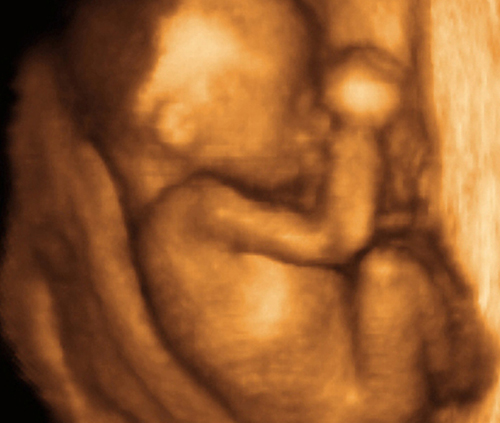
Because water can travel through the skin
and the baby is floating in amniotic fluid, her water content is really
high, nearly 90 percent. As your baby’s skin thickens and becomes less
permeable, and her kidneys better regulate the amount of water lost in
the urine, her proportion of water will reduce to 70 percent at delivery
and again to about 60 percent by the age of 10 as kidney function
continues to improve.
Fluids conduct
sound waves but the inner ear is still immature and it will be three
weeks before a startle response to sounds can be reliably seen on a
scan. As both the uterine wall and the ear drums become thinner, she
will gradually respond to higher frequencies and quieter sounds.
Pregnant women used to believe that not drinking enough water would make the baby dirty!
While it is important to stay hydrated during pregnancy, the amniotic fluid is not affected by what you drink.
… Your baby
Low-lying placenta
Placenta previa is when the placenta
is either partially covering (minor) or completely covering (major) the
cervix. In major placenta previa, the baby cannot be born vaginally.
Major/complete placenta previa poses a high risk of heavy bleeding,
either in the later stages of pregnancy or during the actual labor,
which is treated as an emergency.
If a low-lying placenta is
detected at your 20-week scan, you may be offered another scan at about
34 weeks; the placenta may “move up” as the uterus grows, and by about
34 weeks no longer be low. With major placenta previa, you may be
admitted to the hospital for bed rest in late pregnancy.
Major placenta previa
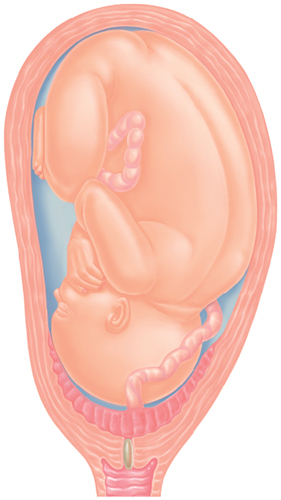
Minor placenta previa
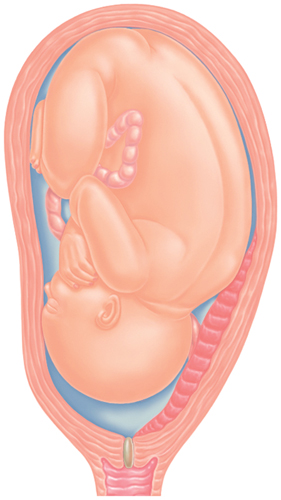
You are 19 Weeks and 3 Days 144 days to go…
Are you feeling your baby kicking? She’s letting you know she’s definitely in there—a wonderful pregnancy milestone.
Your baby today
The toes will wiggle and stretch just as much as the hands and
fingers. Your baby is extremely flexible at this time and as likely to
bring one or both feet up to her mouth as she is her hands in order to
explore them with her sensitive mouth and lips.
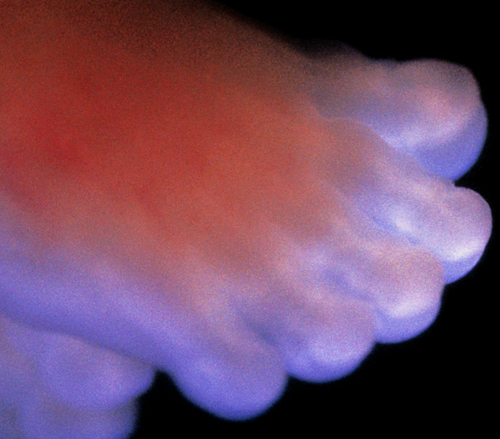
At around this time, you’re likely to feel that awe-inspiring first kick.
While your baby has been moving in your uterus since around the sixth
week of gestation, it’s only at this stage that she’ll make her
movements so definitely felt (although some women do feel movements from
around 15 to 16 weeks). When exactly you feel that movement can be
affected by your body weight, your baby’s position, the location of your
placenta, and whether it’s your first pregnancy.
Experiencing the
first sensation of movement, whether it’s a feeling of bubbles,
butterflies, flipping goldfish, or even a resounding kick, is likely to
be an emotionally charged moment. After all, this is the first time your
baby has communicated with you, even though she’s not aware of what
she’s doing.
Once you’ve felt your baby move, you may want her to do it again—just to make sure you didn’t imagine it. You may, however, not feel another movement for a few days.
Your partner may want to rest his hand on your belly when your baby is
most active (usually when you’re resting so that your baby isn’t being
rocked to sleep by movement) to experience those first thumps himself.
It won’t hurt your baby to play with her, so gently press on your
abdomen when she kicks.
Maternity swimwear
Swimming is fantastic exercise during pregnancy, but you may need to invest in new swimwear as your breasts and abdomen grow.
Maternity swimsuits are reinforced with extra fabric to accommodate your belly.
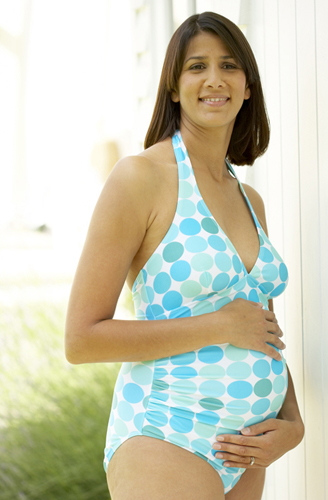
Maternity bikinis are designed with a generous cup size, and the bottoms fit neatly under your belly.
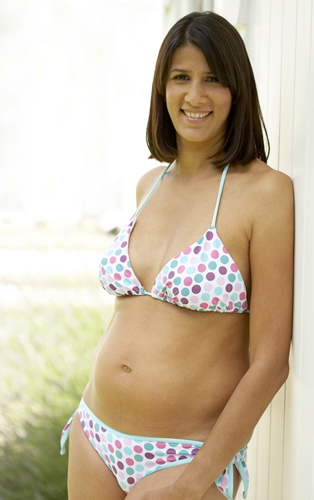
Comfort and support:
maternity swimsuits have additional support. These swimsuits are
designed to be higher at the back and have more support in the cups.
Maternity swimwear is made with stretchy fabric that is comfortable and
will give as you grow.
Try a tankini: this is a two-piece swimsuit that has a tank-style, rather than bra, top. It will flash your belly without revealing too much.
If you’re self-conscious about your belly, wear a sarong. If you prefer to bare your belly to females only, go to women’s sessions at your local pool.